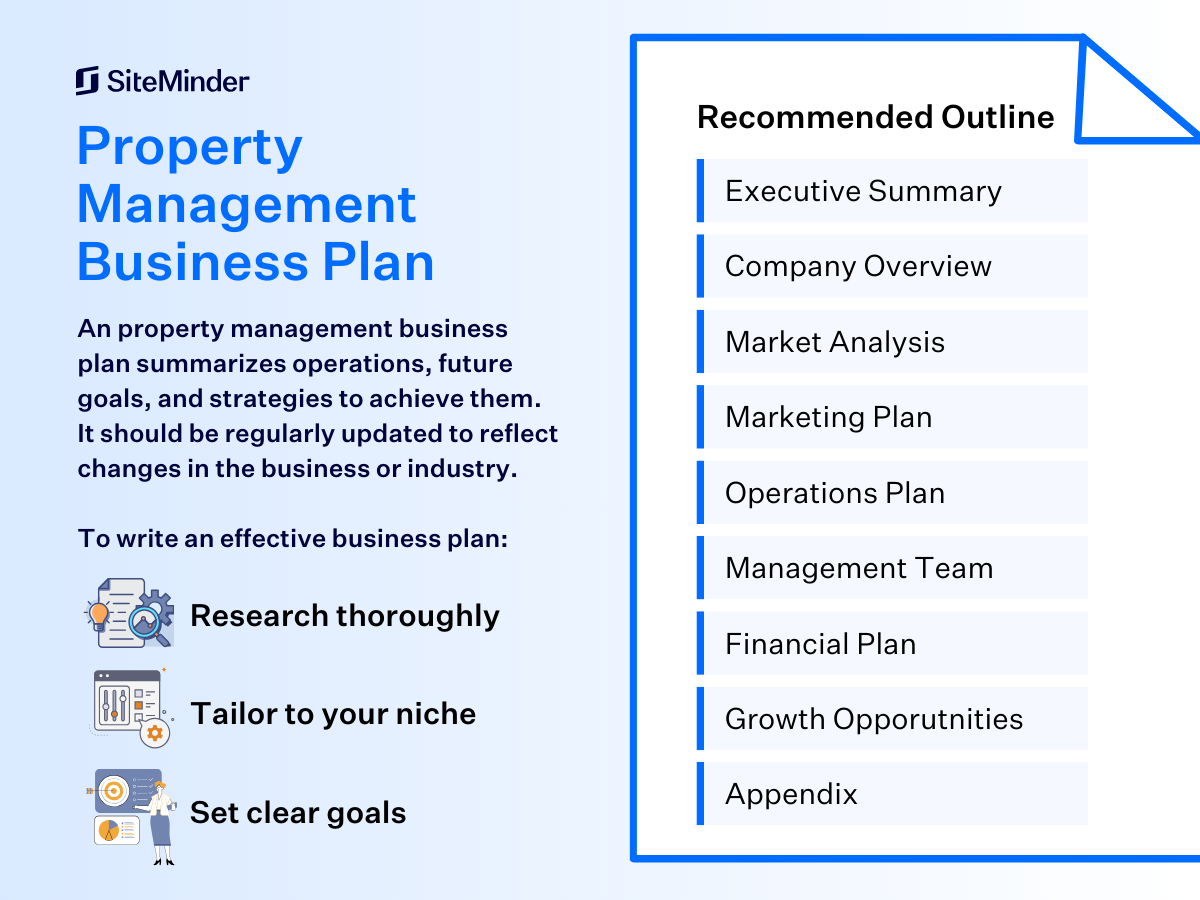What is a property management business plan?
A property management business plan is a document created by property managers or business owners to outline strategies and goals for managing and growing a property management company.
Property management companies are hired by property owners to oversee day-to-day operations, maintenance and leasing of residential, commercial or industrial properties.
In this guide we’ll hone in on how to start a property management business that services hotels and other short-term accommodation providers.
How important is a property management business plan?
A property management company business plan is critical for anyone hoping to build and grow a successful business. It provides a clear plan for creating a property management company, and how to grow a property management business.
By building a clear roadmap for growth, operations and financial management, you can greatly increase your chances of success, and can ensure the ongoing sustainability of the property management company.
Enact your management business plan with SiteMinder
Integrating seamlessly with the world’s leading property management systems, SiteMinder is designed to generate serious revenue for your accommodation business.
Learn more

Key considerations before writing a property management business plan
Before writing a property management business plan, it’s vital to make a few key considerations, from identifying your target market and USPs, to assessing your finances, including calculating your initial outlay, operating expenses and revenue projections. Other considerations include:
Property management goals
Your property management plan should begin with clear goals, as this gives your business something to aim for. Goals should be specific, measurable and achievable.
Property management SWOT analysis
Most property management business plan examples will feature a SWOT analysis, which assesses your business’s:
- Strengths, such as industry expertise.
- Weaknesses, such as financial or resource limitations.
- Opportunities, such as new markets or services.
- Threats, such as competition.
A SWOT analysis is a great way to identify both risks and opportunities, in order to strategise effectively and mitigate potential issues.
Property management business model
A commercial property management business plan will be very different to an Airbnb property management business plan, so you need to identify who your target market is, and the services you will offer your clients.
Property management process flow chart
A process flow chart helps to clarify and streamline operations by visualising how you’ll manage your properties. It details the steps involved in each process, from guest acquisition to maintenance.
Property management company obligations
What are the obligations of a property management company? They can include day-to-day operations, compliance with local laws, handling issues, and managing financial reporting.

What is the structure of a property management business plan?
In terms of the physical business plan, property management templates can vary depending on the needs of the owners and stakeholders. But the following property management business plan sample gives you an idea of the sort of information such a document might include.
Executive summary
The executive summary provides a brief overview of the property management business, highlighting key goals, services, target market and financial projections.
Company description
This section of your property business plan outlines the mission, vision and structure of your property management business, including its legal status, mission and USPs, and any relevant history.
Property management services outline
This is a detailed list of services offered by your property management company, and may include maintenance, guest management and collecting payments. This section will also outline whether you’re choosing to franchise your business or maintain its independence.
Market analysis
This section evaluates the property management market in your area and vertical, including target demographics, market demand, competition and industry trends. It will outline any specialised markets you plan to target, such as boutique/luxury hotels or extended-stay properties.
Management team and staff organisation
At this point of our property management plan template we’ll describe the structure of both the management team and the team as a whole, including the qualifications and responsibilities for each role.
Marketing plan
Your property management marketing plan will briefly detail the strategies that you’ll use to attract both the owners of the properties you’ll manage, and the guests that will fill those properties, including advertising, digital marketing and networking.
Operational plan
Here you’ll outline your day-to-day operations, including property management processes and technologies. You’ll also address what is the biggest responsibility for a property management business: risk management. Plan contingencies for emergencies and operational disruptions.
Financial plan
This section provides a complete breakdown of your business’s revenue streams, expenses and financial projections. It will include strategies for securing any necessary funding, managing revenue and ensuring ongoing profitability.
Growth opportunities
This section identifies potential areas for business expansion, such as entering new markets through multi-location or internationalisation strategies, or offering additional services (while maintaining service quality).
How to build a property management company and grow the business
As you can tell from the property management proposal example above, building a property management business is no small endeavour, and such a big question demands an equally big answer.
But very briefly, to build a successful property management company, you should:
- Craft the clear business plan described in this article.
- Build a strong team with deep industry expertise.
- Invest in marketing to attract property owners and guests.
- Provide excellent customer service to grow your client base.
When the time comes to scale the business, you will need to have established efficient processes, which these days are almost always powered by clever technology: specifically a property management system (PMS) and a distribution and revenue generation tool like SiteMinder.
